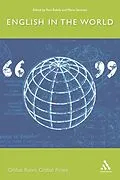English today is a truly global language which plays an important role in international communication, trade, diplomacy, sport, science, technology and culture. One of the consequences of the global predominance of English is that non-native speakers of E
Autorentext
Rani Rubdy is an independent researcher.
Inhalt
Introduction - Rani Rubdy and Mario Saraceni
Part I: Conceptualising EIL
1. An interview with Tom McArthur Rani Rubdy and Mario Saraceni
2. Global intelligibility and local diversity: possibility or paradox? Jennifer Jenkins, King's College London
3. English as a lingua franca in the expanding circle: what it isn't Barbara Seidlhofer, Vienna University
4. Defining the 'successful bilingual speaker' of English Luke Prodromou, freelance teacher
5. Which model of English: Native-speaker, nativised or lingua franca? Andy Kirkpatrick, Curtin University of Technology, Perth.
Part I: Conceptualising EIL
1. An interview with Tom McArthur Rani Rubdy and Mario Saraceni
2. Global intelligibility and local diversity: possibility or paradox? Jennifer Jenkins, King's College London
3. English as a lingua franca in the expanding circle: what it isn't Barbara Seidlhofer, Vienna University
4. Defining the 'successful bilingual speaker' of English Luke Prodromou, freelance teacher
5. Which model of English: Native-speaker, nativised or lingua franca? Andy Kirkpatrick, Curtin University of Technology, Perth.
6. World Englishes or English as a lingua franca? A view from the perspective of non-Anglo Englishes Peter Tan, Vincent Ooi and Andy Chiang, National University of Singapore.
7. Standard English in the World Anthea Fraser Gupta, University of Leeds.
Part II: Pedagogical Implications of EIL
8. EIL curriculum development Sandra McKay, San Francisco State University
9. A multi-dimensional approach to teaching English for the world Brian Tomlinson, Leeds Metropolitan University
10. Teaching EIL - teaching international or intercultural English? What teachers should know Nicos Sifakis, Hellenic Open University
11. English as an international language, world Englishes and their conditions of (im)possibility Ruanni Tupas, National University of Singapore
12. English in the world does not mean English everywhere: the case for multilingualism in the ELT/ ESL profession Michael Joseph and Esther Ramani, University of the North, S Africa
13. An interview with Suresh Canagarajah Rani Rubdy and Mario Saraceni
7. Standard English in the World Anthea Fraser Gupta, University of Leeds.
Part II: Pedagogical Implications of EIL
8. EIL curriculum development Sandra McKay, San Francisco State University
9. A multi-dimensional approach to teaching English for the world Brian Tomlinson, Leeds Metropolitan University
10. Teaching EIL - teaching international or intercultural English? What teachers should know Nicos Sifakis, Hellenic Open University
11. English as an international language, world Englishes and their conditions of (im)possibility Ruanni Tupas, National University of Singapore
12. English in the world does not mean English everywhere: the case for multilingualism in the ELT/ ESL profession Michael Joseph and Esther Ramani, University of the North, S Africa
13. An interview with Suresh Canagarajah Rani Rubdy and Mario Saraceni
Titel
English in the World
Untertitel
Global Rules, Global Roles
Autor
EAN
9781441118493
ISBN
978-1-4411-1849-3
Format
E-Book (pdf)
Hersteller
Herausgeber
Veröffentlichung
25.03.2006
Digitaler Kopierschutz
Adobe-DRM
Dateigrösse
11.98 MB
Anzahl Seiten
226
Jahr
2006
Untertitel
Englisch
Unerwartete Verzögerung
Ups, ein Fehler ist aufgetreten. Bitte versuchen Sie es später noch einmal.
